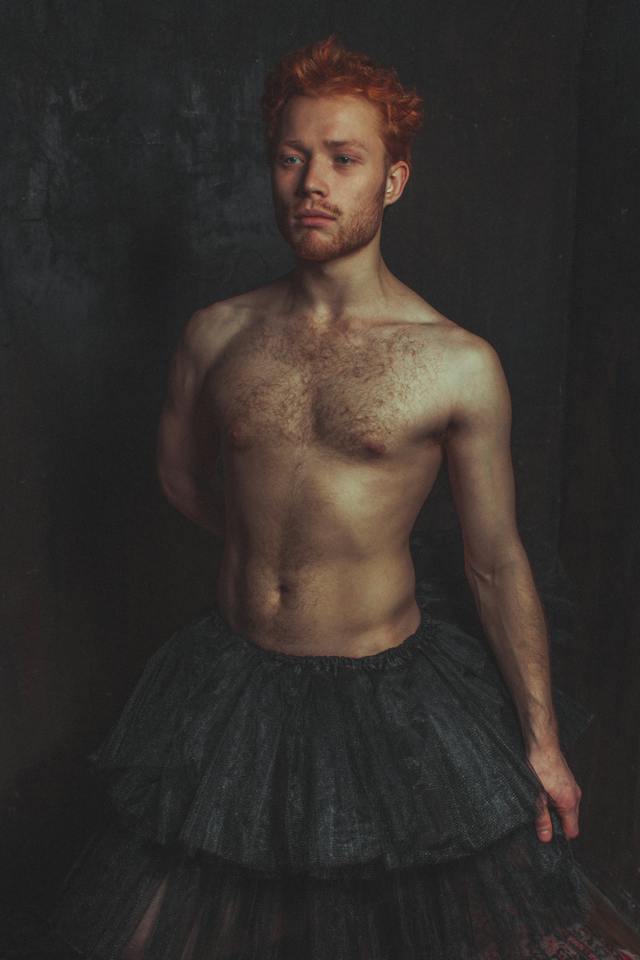The cop said, “Anyone see a man in a dress?”
This was at the bar in the alley. I drank there on Saturdays at happy hour. I worked at a restaurant, a dive that served egg on a roll then, starting at eleven, cheesesteaks and French fries with gravy. I covered breakfast and lunch. The owner’s knee looked shot through with rockets then painted blue. He ate pain pills and slept in the stockroom on a pile of boxes. My mom and dad were dead. My sister, who had raised me by pretending we weren’t singled out for failure, worked every job to support us then married a middle-aged man as soon as I barely graduated. She has tiny kids now. Every year I save for a trip and fly across the country. As a kid I saw words backwards but no one understood that. One year our teachers staged a walkout over a lack of resources. No one showed up. Not a parent. Not the local news. I want to go back to college, to start again, but the application looks like ants running away from poison. I think sometimes I’d like to bartend. I think sometimes I’d like to paint houses or build shelves.
The cop said, “A man in a dress—anyone?” but harsh, a terrible joke.
I sat at the opposite end of the bar and turned slightly to better obscure my face.
The cop wore ripped-up jeans and a tight t-shirt.
He could have been a biker.
I’d bought my first dress for six bucks because I was the only waiter in the restaurant and I thought it would be funny. Then I thought it would be hilarious to buy another dress. Then a skirt. Even the owner laughed. I liked working with women. I like the gossip. The next dress was more comfortable than any pants I’d ever worn so I kept buying women’s clothes from the Good Will on Carson Street. I liked the feel of the fabrics. I liked being less restricted.
It was nothing dramatic.
I wanted to feel good and dresses made me feel good.
But one of the waitresses said, “It’s not funny anymore.”
I said, “It’s not supposed to be,” and I meant funny anymore.
Earlier that morning, when a customer yanked at my skirt in a disrespectful way, I flipped a plate of French fries into his lap. He jumped up like he’d been covered in hot grease and shouted.
He said, “I’ll fucking kill you!” while dusting away fries that had already fallen.
The owner stepped in and said, “I’ll call the cops.”
He stood with a cane, something I’d never seen before, his knee wrapped in a brace he’d bought at the dollar store. The cane looked menacing. He held it like it was more than a cane. I waited for the waitress who disliked my dresses to say something but she kept filling the ice machine like it was feeding us oxygen. Another waitress moved to the owner like we were a gang.
The owner said, “You can leave now,” and pulled out his phone.
The man said, “I am the fucking cops,” but walked off, disgusted.
Before he made the door, he flipped his napkin over his shoulder in a dramatic way.
I guess he was a narc or undercover, I don’t know the cop words.
Now, a few hours later, the bartender said, “No men in dresses here,” but nodded at the bathroom like a man in a dress might be hiding. The bartender’s beard was gray with purple highlights. He’d just married his partner of thirty-five years. The rest of us looked like we’d been attending rock concerts for decades and didn’t plan to stop.
The cop nodded back, a discrete thanks, then stepped into the bathroom.
The bartender motioned, meaning I should escape.
I finished my beer but waited to consider my options.
The older I get, the more I wait, the more I consider.
My sister writes sometimes, old-fashioned letters.
She writes my name in big bubble letters and colors them in with crayons.
My parents sometimes speak from the grave but through cars and bartenders, through foods and old songs, how connection happens like electricity sparking through wires underneath the city. I miss them terribly, even on days when I can’t remember what I miss.
I thought the cop wore three heads on his shoulders, two invisible, one I could see.
A stall door slammed in the restroom.
One time, when I was ten, a group of kids chased me off the bus but before they could catch me and tackle me to the ground my sister showed up in her junky car, still wearing her blue vest from her shift at Walmart. I climbed in. She tried to run one over.
The bartender said, “Go. Now,” very worried but in a whisper.
My memories are sometimes more real than the rooms I work.
I stood and straightened my outfit.
The bartender motioned with his chin.
Another stall door rattled. I imagined the cop’s boot.
When I grow old, I will tell it all however I want, depending on how I grow old.
Or if.
